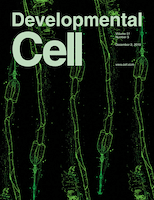
DEVELOPMENT GROWTH & DIFFERENTIATION
Scope & Guideline
Illuminating the Pathways of Growth and Differentiation
Introduction
Aims and Scopes
- Developmental Mechanisms:
Research on the fundamental biological processes that govern development, including gene expression, signaling pathways, and cellular interactions. This encompasses studies on embryonic development, tissue regeneration, and organogenesis. - Model Organisms:
Utilization of various model organisms such as zebrafish, Xenopus, Drosophila, and mouse models to investigate developmental processes. These species provide insights into conserved mechanisms across different taxa. - Cellular and Molecular Biology:
Exploration of cellular dynamics, including cell adhesion, migration, differentiation, and the role of specific molecules in these processes. This area focuses on understanding how cellular behaviors contribute to larger developmental outcomes. - Genetic and Epigenetic Regulation:
Investigation into how genetic factors and epigenetic modifications regulate development and differentiation. Studies often include gene editing techniques and the analysis of transcription factors and their roles in developmental pathways. - Comparative Developmental Biology:
Analysis of developmental processes across different species to understand evolutionary adaptations and conservation of mechanisms. This includes comparative transcriptomics and evolutionary developmental biology.
Trending and Emerging
- Single-Cell Transcriptomics:
The use of single-cell transcriptomic techniques is on the rise, allowing researchers to dissect cellular heterogeneity and lineage relationships during development. This approach provides insights into the complex dynamics of gene expression at the individual cell level. - CRISPR and Gene Editing Technologies:
Advancements in CRISPR/Cas9 and other gene editing technologies are increasingly being applied to developmental biology. Researchers are utilizing these tools to investigate gene function, create model organisms, and explore genetic regulation of development. - Regenerative Medicine and Tissue Engineering:
There is a growing interest in regenerative biology, particularly studies that explore the mechanisms of tissue regeneration and the application of stem cell technologies for therapeutic purposes. This trend reflects a broader interest in translating developmental biology findings into clinical applications. - Mechanobiology:
The intersection of developmental biology and mechanobiology is gaining traction, with researchers investigating how mechanical forces influence cellular behavior and developmental processes. This area explores the physical aspects of development and their biological implications. - Environmental Influences on Development:
Emerging research is increasingly focusing on how environmental factors, including endocrine disruptors and climate change, impact developmental processes. This trend highlights the importance of understanding the interplay between external factors and biological development.
Declining or Waning
- Traditional Animal Models:
While studies on traditional animal models like mice and frogs remain important, there has been a gradual shift towards more innovative and less conventional models such as zebrafish and stem cell-derived systems, leading to reduced emphasis on classical models. - Basic Histological Techniques:
Basic histological analyses, while fundamental, appear to be waning in favor of more advanced imaging and molecular techniques. There is a growing preference for high-resolution imaging and single-cell analysis over traditional histological methods. - General Developmental Pathways:
Research focusing on broad developmental pathways without specific mechanistic insights is declining. There is a trend towards more detailed studies that elucidate specific molecular interactions and regulatory networks. - In vitro Models:
In vitro studies are still relevant, but there is a noticeable decrease in their frequency as researchers increasingly prioritize in vivo models that better replicate the complexities of living organisms. - Pharmacological Manipulations:
While pharmacological studies were once a common approach, there is a shift towards genetic and molecular techniques that provide more precise control over developmental processes, leading to a decline in pharmacological approaches.
Similar Journals

SEMINARS IN CELL & DEVELOPMENTAL BIOLOGY
Pioneering Research for a Deeper Biological InsightSEMINARS IN CELL & DEVELOPMENTAL BIOLOGY is a premier journal published by Academic Press Ltd - Elsevier Science Ltd, focusing on the vital domains of cell and developmental biology. With an impact factor that reflects its rigorous contributions to the field, this journal embodies the highest standards of academic excellence, currently ranking in the Q1 quartile for both Cell Biology and Developmental Biology categories as of 2023. Researchers and practitioners will appreciate its robust Scopus ranking, placing it within the top tiers of developmental biology and cell biology, with percentile ranks of 94th and 90th respectively, showcasing the journal's influential presence in the scientific community. The journal aims to disseminate comprehensive reviews, cutting-edge research articles, and significant advances in the understanding of cellular mechanisms and developmental processes, thereby catering to a diverse audience that includes researchers, scholars, and students dedicated to the life sciences. Given its commitment to open access, SEMINARS IN CELL & DEVELOPMENTAL BIOLOGY promotes widespread dissemination of knowledge, enhancing collaborative research efforts and driving innovation across biological disciplines.

DIFFERENTIATION
Fostering Innovation in Cancer and Cell BiologyDIFFERENTIATION is a respected peer-reviewed journal published by Elsevier Science Ltd, dedicated to advancing knowledge in the fields of Cancer Research, Cell Biology, Developmental Biology, and Molecular Biology. With an established history since 1973, the journal continuously explores the intricacies of cellular and molecular processes that govern differentiation in biological systems, thus playing a pivotal role in shaping contemporary research directions. Currently indexed in the Q3 quartile across multiple relevant categories, it provides a crucial platform for researchers to disseminate their findings and engage with the scientific community. DIFFERENTIATION does not offer open access, but it remains a valuable resource for academics seeking to enhance their understanding of the fundamental mechanisms that underpin life sciences. By fostering a rigorous dialogue among scientists, it contributes significantly to the ever-evolving landscape of biochemistry and genetics.

INTERNATIONAL JOURNAL OF DEVELOPMENTAL BIOLOGY
Elevating Research in Embryology and BeyondThe International Journal of Developmental Biology, published by the University of Basque Country UPV-EHU Press, has been a pivotal resource in the field of developmental biology since its inception in 1989. With an ISSN of 0214-6282 and an E-ISSN of 1696-3547, this journal serves as a platform for groundbreaking research and exploration within the realms of embryology and developmental biology. Although currently classified in the Q4 category for Developmental Biology and Q3 in Embryology as of 2023, the journal continues to provide vital insights that influence contemporary scientific understanding and practices. It ranks 14th out of 21 in the field of Embryology and holds a 35th percentile ranking in this specialized domain, emphasizing its emerging relevance in the academic community. Researchers, professionals, and students alike are encouraged to utilize the journal’s content to enrich their knowledge and drive innovation within developmental sciences. With an eye towards future developments, the journal anticipates continued evolution through the years, maintaining its commitment to high-quality, impactful research.

Journal of Developmental Biology
Connecting Experts in Developmental DiscoveryJournal of Developmental Biology, published by MDPI, is an esteemed open access journal that has been contributing to the field since its inception in 2013. With a focus on developmental processes across various biological systems, this journal serves as a vital platform for disseminating cutting-edge research and fostering dialogue among experts in the fields of Cell Biology, Developmental Biology, and Molecular Biology. The journal currently holds a commendable Q2 ranking in both Developmental Biology and Molecular Biology, underscoring its significance in advancing knowledge within these domains. Operating out of Switzerland, and featuring an engaging array of articles, the journal prioritizes accessibility through its Open Access model, further expanding the reach of vital research findings. Whether you are a seasoned researcher or an enthusiastic student, the Journal of Developmental Biology provides an essential resource for the latest insights and developments in this rapidly evolving field.

GENES & DEVELOPMENT
Bridging Breakthroughs in Genetics and DevelopmentGENES & DEVELOPMENT, published by COLD SPRING HARBOR LAB PRESS, stands as a premier journal in the fields of Developmental Biology and Genetics, boasting a remarkable impact factor that reflects its prestigious position in the academic community—ranking Q1 in both disciplines as of 2023. Since its inception in 1987, this journal has been at the forefront of disseminating cutting-edge research, effectively bridging the gap between laboratory breakthroughs and their applications in health and disease. Researchers and professionals rely on GENES & DEVELOPMENT for its rigorous peer-review process and its commitment to promoting innovative studies that unravel the complexities of gene functions and developmental processes. With Scopus rankings placing it in the top percentile among its peers, this journal serves as a vital resource for students and established scientists alike, aspiring to expand their knowledge and contribute to the ever-evolving landscape of genetic and developmental research.

DEVELOPMENTAL BIOLOGY
Transforming Knowledge in Cell and Molecular BiologyDEVELOPMENTAL BIOLOGY, published by Academic Press Inc., Elsevier Science, stands as a pivotal journal in the fields of cell biology, developmental biology, and molecular biology since its inception in 1959. Renowned for its rigorous peer-review process, this journal serves as a platform for publishing cutting-edge research, reviews, and insights that drive forward our understanding of developmental processes at the cellular and molecular levels. With an impressive track record, it is classified in the Q2 quartile across multiple categories, reflecting its significant impact and relevance in academia and research communities. Although the journal does not provide Open Access options, it remains accessible via numerous academic databases, ensuring a wide reach for researchers, professionals, and students alike. With a commitment to advancing the field, DEVELOPMENTAL BIOLOGY continues to be essential reading for those looking to stay at the forefront of developmental research and its applications.

Annual Review of Cell and Developmental Biology
Advancing the Frontiers of Cell and Developmental BiologyThe Annual Review of Cell and Developmental Biology, published by Annual Reviews, stands as a premier journal in the fields of cell biology and developmental biology. Established in 1995, this influential journal has continuously provided comprehensive and critical reviews that synthesize the latest findings in these vibrant research areas, catering to the interests of researchers, professionals, and students alike. With an impressive impact factor, the journal ranks in the top quartile (Q1) for both Cell Biology and Developmental Biology, boasting remarkable Scopus rankings—#1 in Developmental Biology and #22 in Cell Biology. This emphasizes its significance and authority within the academic community. Although the journal does not operate under an open-access model, it remains a crucial resource for those seeking to stay at the forefront of scientific discoveries and theoretical advancements. The Annual Review of Cell and Developmental Biology continues to solidify its status as an essential platform for sharing knowledge and stimulating scientific inquiry.

Molecular Cell
Where Innovative Research Meets Cellular Insight.Molecular Cell, published by Cell Press, is a leading journal in the fields of cell biology and molecular biology. Established in 1997, this prestigious journal boasts a significant impact within the scientific community, evidenced by its impressive 2023 Scopus rankings, placing it in the top 2% of its field (Rank #10/410 in Molecular Biology, Rank #12/285 in Cell Biology). With a focus on cutting-edge research that bridges the gap between molecular genetics and cellular function, Molecular Cell serves as an essential platform for the dissemination of vital findings and innovative methodologies. Although it follows a traditional publishing model without Open Access options, its rigorous peer-review process and high standards ensure that articles published within these pages are of the utmost quality, making it an invaluable resource for researchers, professionals, and students alike seeking to stay at the forefront of scientific discovery. The journal's address is 50 Hampshire St, Floor 5, Cambridge, MA 02139, United States, reinforcing its commitment to fostering scientific excellence and collaboration.

DEVELOPMENTAL CELL
Exploring the Frontiers of Cellular DiscoveryDEVELOPMENTAL CELL, published by CELL PRESS, stands as a premier journal in the fields of Biochemistry, Genetics and Molecular Biology, Cell Biology, and Developmental Biology. With a significant influence evidenced by its Q1 rankings across several categories in 2023 and a remarkable Scopus ranking placing it at the 98th percentile for Developmental Biology, this journal is pivotal for researchers and academics aiming to advance their understanding of cellular processes. Covering a broad range of topics from molecular mechanisms to cellular developmental pathways, DEVELOPMENTAL CELL publishes cutting-edge research articles that contribute to the dynamic landscape of cell biology and related disciplines. Although it does not currently offer open access, the journal is accessible through institutional subscriptions, reinforcing its commitment to disseminating high-quality scientific knowledge produced by leading experts in the field. Based in the United States, DEVELOPMENTAL CELL continues to push the boundaries of discovery and innovation in life sciences, making it an essential resource for professionals, researchers, and students alike in the quest for foundational biological insights.

STEM CELLS AND DEVELOPMENT
Elevating Knowledge in Stem Cell Biology and DevelopmentSTEM CELLS AND DEVELOPMENT, published by Mary Ann Liebert, Inc., is a leading peer-reviewed journal dedicated to the rapidly advancing fields of stem cell biology and developmental science. With an ISSN of 1547-3287 and an E-ISSN of 1557-8534, the journal encompasses a broad range of topics central to understanding stem cells' roles in development and regeneration processes. It holds a prestigious standing within its category quartiles, ranking Q3 in Cell Biology, Q2 in Developmental Biology, and Q2 in Hematology for 2023. With its convergence from 2004 to 2024, STEM CELLS AND DEVELOPMENT fosters an innovative platform for researchers, professionals, and students to disseminate groundbreaking research, share insights, and explore novel therapeutic approaches. Open access options enhance the journal's visibility and accessibility, promoting a collaborative exchange of information among the scientific community. Positioned at the forefront of stem cell research and its applications, this journal is vital for anyone seeking to stay informed about the latest advancements and trends within these critical areas of study.